
Charles the Bold, baptised Charles Martin, was Duke of Burgundy from 1467 to 1477. He was the last Duke of Burgundy from the House of Valois.

Dinant is a Walloon city and municipality located on the River Meuse, in the Belgian province of Namur. It is around 90 kilometres (56 mi) south-east of Brussels, 30 kilometres (19 mi) south-east of Charleroi, 30 kilometres (19 mi) south of Namur and 20 kilometres (12 mi) north of Givet (France).
David of Dinant was a pantheistic philosopher. He may have been a member of, or at least been influenced by, a pantheistic sect known as the Amalricians. David was condemned by the Church in 1210 for his writing of the "Quaternuli", which forced him to flee Paris. When and where he died is unknown; all that can be ascertained is that he died after the year 1215, as he was condemned again in the council of 1215.

Hombourg-Haut is a commune located in the department of Moselle, region of Grand Est, in the cultural and historical region Lorraine, north-eastern France.
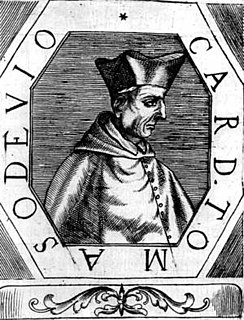
Thomas Cajetan, also known as Gaetanus, commonly Tommaso de Vio or Thomas de Vio, was an Italian philosopher, theologian, cardinal and the Master of the Order of Preachers 1508-18. He was a leading theologian of his day who is now best known as the spokesman for Catholic opposition to the teachings of Martin Luther and the Protestant Reformation while he was the Pope's Legate in Augsburg, and perhaps also among Catholics for his extensive commentary on the Summa Theologica of Thomas Aquinas.
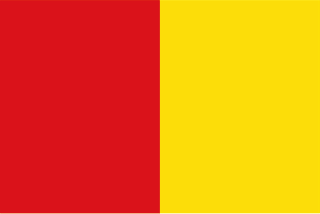
The Prince-Bishopric of Liège or Principality of Liège was a state of the Holy Roman Empire in the Low Countries, situated for the most part in present Belgium, which was ruled by the Bishop of Liège. As a prince, the Bishop held an Imperial Estate and had seat and voice at the Imperial Diet. The Prince-Bishopric of Liège should not be confused with the Bishop's diocese of Liège, which was larger.

Lawrence of Aquilegia was a thirteenth-century Italian canon and teacher. He is best known for his treatises on the ars dictaminis—the medieval art of letter writing. Lawrence’s major works found inspiration in Ciceronian rhetoric but introduced a new phatic element to writing and include the Summa dictaminis edita iuxta doctrinam Tullii and the Practica sive usus dictaminis edita ad utilitatem rudium. The Practica is his most popular work and characterizes his pragmatic, phatic approach to letter writing through the use of tables.
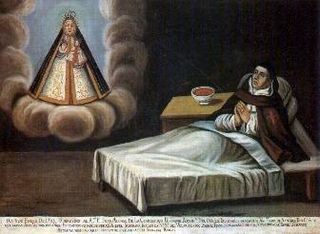
The French School of Spirituality was the principal devotional influence within the Catholic Church from the mid-17th century through the mid-20th century not only in France but throughout the church in most of the world. A development of the Catholic Reformation like the Spanish mystics and the Society of Jesus, it focused the devotional life of the Catholic faithful on a personal experience of the person of Jesus and the quest for personal holiness. It was perhaps more concrete than the Iberian example and thus easier to teach, but it shared with the Spanish saints their focus on the Divine Person. This movement in Catholic spirituality had many important figures over the centuries, the first being its founder, Cardinal Pierre de Berulle (1575–1629).
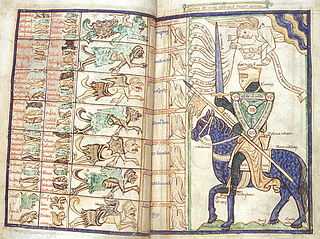
William Perault,, also spelled Perauld; Latinized Peraldus or Peraltus, was a Dominican writer and preacher.
Robert of Courçon was an English cardinal of the Roman Catholic Church.
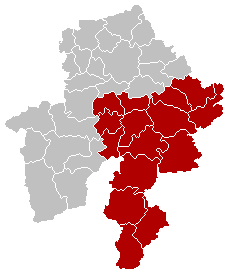
The Arrondissement of Dinant is one of the three administrative arrondissements in the Province of Namur, Belgium. It is both an administrative and a judicial arrondissement. However, the Judicial Arrondissement of Dinant also comprises the municipalities of the Arrondissement of Philippeville.

Shadows on the Rock is a novel by the American writer Willa Cather, published in 1931. The novel covers one year of the lives of Cecile Auclair and her father Euclide, French colonists in Quebec. Like many of Cather's books, the story is driven by detailed portraits of the characters, rather than a narrative plot.
The Little French Lawyer is a Jacobean era stage play, a comedy written by John Fletcher and Philip Massinger. It was initially published in the first Beaumont and Fletcher folio of 1647.

Toury-Lurcy is a commune in the Nièvre department in central France.

Alain Crepin is a Belgian saxophonist, composer, music educator and conductor.
Conrad of Mure, also often referred to as Conrad of Muri, was rector of the diocesan school attached to the Zurich Minster and author of a number of important treatises on rhetoric and poetry. His Summa de arte prosandi (1275–1276) is one of the most learned introductions to the art of letter writing in the Middle Ages.

Jacques Bonne-Gigault de Bellefonds (1698–1746) was a French prelate who was Archbishop of Arles from 1741 to 1746.
The Wars of Liège were a series of three rebellions by the Prince-Bishopric of Liège, in the town of Liège in modern-day Belgium, against the expanding Duchy of Burgundy between 1465 and 1468. On each occasion, the rebels were defeated by Burgundian forces commanded by Charles the Bold and the city was twice burned to the ground.
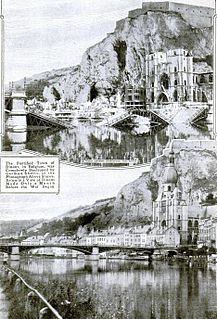
The Battle of Dinant was an engagement fought by French and German forces in and around the Belgian town of Dinant in the First World War, during the German invasion of Belgium. The French Fifth Army and the British Expeditionary Force (BEF) advanced into Belgium and fought the Battle of Charleroi (21–23 August) and Battle of Mons (23 August), from the Meuse crossings in the east, to Mons in the west. On 15 August 1914, German troops captured the Citadel of Dinant which overlooked the town; the citadel was recaptured by a French counter-attack during the afternoon. French troops spent the next few days fortifying the Meuse crossings and exchanging fire with German troops on the east bank.
Heinrich of Meissen was Bishop of Meissen from December 1228 to his death.
















